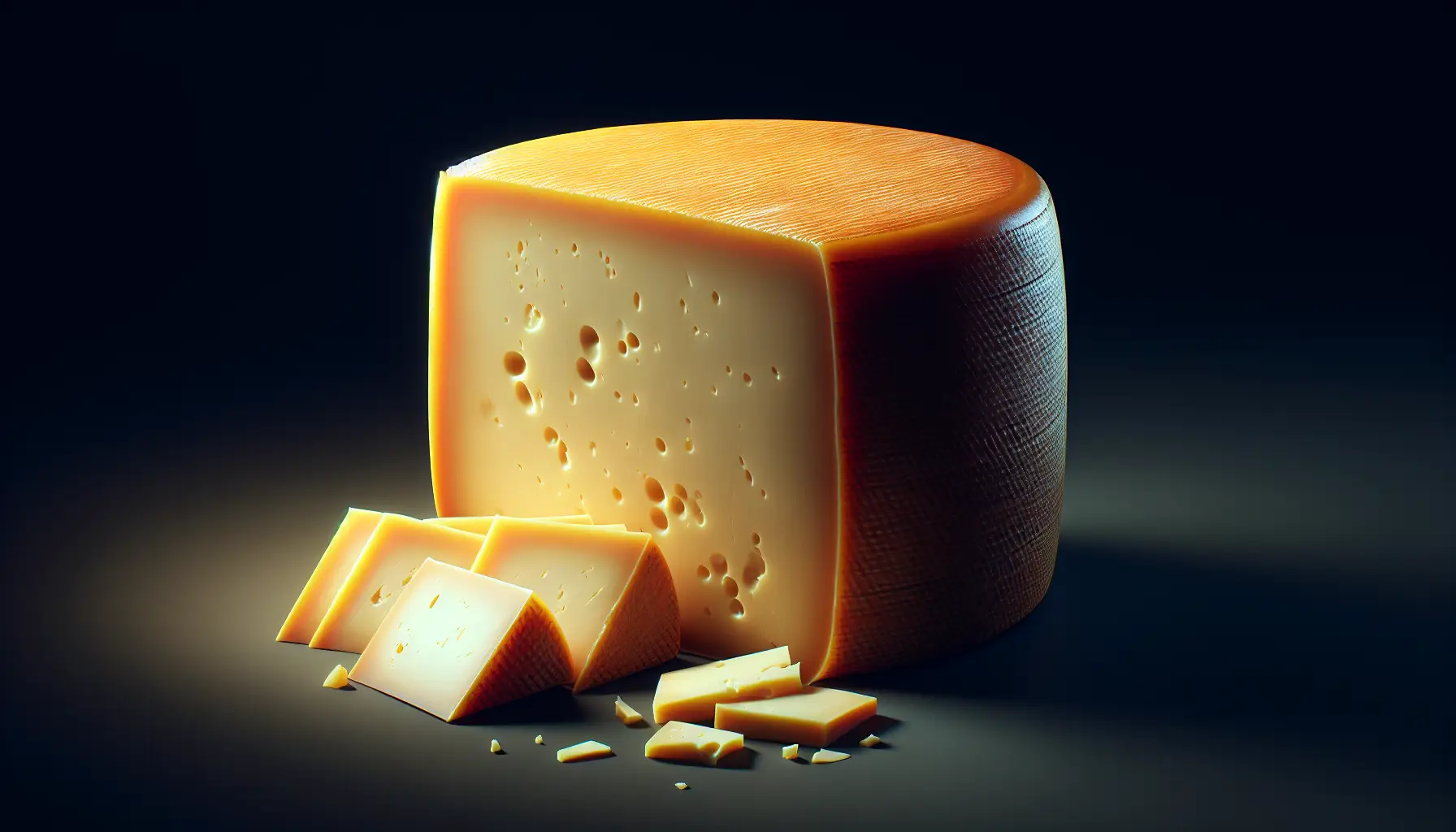What Is Manchego Cheese?
Manchego is a sheep’s milk cheese from the La Mancha region of Spain. Yes, the same place where Don Quixote came from! It’s made using the milk of a special kind of sheep called the Manchega breed. These sheep graze in the dry, hilly area in central Spain, and their milk gives this cheese its unique flavour.
It has a firm and compact texture and a rich, nutty taste. The flavour becomes sharper and more intense with age. The cheese is often matured between 60 days and two years. A younger Manchego will taste fresher and creamier, while an older version (known as “curado” or “viejo”) will be crumbly and strong, with deep, bold notes.
Why Manchego Cheese Stands Out
We know there are lots of cheeses out there, but Manchego truly has something special going on. First of all, it’s protected by a Denomination of Origin (DOP). That’s a fancy way of saying it has to be made in a certain way and in a certain place to be officially called “Manchego.”
The cheese must be made using 100% Manchega sheep’s milk. It can’t contain milk from any other animal. The sheep have to be raised in La Mancha, and only certain traditional methods and tools can be used. These strict rules ensure that every piece of Manchego you get is the real deal, with all the textures and flavours that people have loved for centuries.
The distinctive look of Manchego cheese also sets it apart. The rind is usually a dark brown or grey, with a herringbone pattern pressed into it. This pattern isn’t just for show; it comes from the moulds traditionally made of woven esparto grass.
We offer genuine, traditionally made Manchego cheese at the Cheese Shop Nantwich for anyone curious about how authentic Manchego tastes.
Flavour Profiles by Age
Manchego isn’t a one-flavour cheese. The different stages of ageing offer a range of textures and tastes:
- Fresco (2 weeks of ageing): This version is soft, creamy, and mild. Not very common outside Spain due to its short shelf life.
- Semicurado (3 weeks to 3 months): Slightly firmer, with a mild, nutty flavour. Excellent for people who enjoy mellow cheeses.
- Curado (3 to 6 months): This is the middle ground. It’s firmer, has small air pockets, and carries a balanced tanginess with buttery undertones.
- Viejo (1 year or more): Dry and crumbly with sharp, complex flavours. Great for grating or bold cheese lovers.
Depending on your taste, you might lean towards the creamy younger types or the more mature, crumbly versions. At the Cheese Shop Nantwich, we carry a range of Manchego ages, so you can try them all and find your personal favourite.
Serving Manchego: Simple Yet Delicious
One of our favourite things about Manchego cheese is its versatility. Whether you’re setting up a party platter, planning a picnic, or just want a savoury snack, Manchego fits in beautifully.
Here are a few classic ways to enjoy it:
- On its own: Cut into neat triangles and serve with olives and almonds.
- With fruit: It pairs amazingly with quince paste (called membrillo in Spain), figs, or apples.
- In tapas: Combine with Serrano ham or chorizo for a true taste of Spain.
- Melted into dishes: Though it’s not a melt-heavy cheese, it can add depth to cooked meals when grated over vegetables or used in omelettes.
Pair it with a glass of robust Spanish red wine or even a dry sherry, and your plate will be a trip to La Mancha in just one bite.
Cultural and Culinary Role in Spain
Manchego cheese isn’t just food in Spain, it’s part of the culture. It’s served at family gatherings, rural markets, fancy restaurants, and casual tapas bars. It’s the kind of cheese that travels through generations, with recipes passed down just like stories and traditions.
In fact, there are popular Spanish sayings and folk songs that mention Manchego cheese. It was considered such a treasure that families used to guard their wheels of cheese carefully, serving slices only on special occasions.
Even in today’s modern world, authentic Manchego is still handmade by small-scale producers in the traditional way. If you buy genuine DOP-labelled Manchego like the ones offered here, you’re not just buying cheese; you’re sharing a piece of Spanish history.
Where to Buy Manchego Cheese in the UK
You don’t need to travel to Spain to enjoy Manchego. The Cheese Shop Nantwich is proud to offer authentic, imported Manchego cheese. Whether you’re a long-time fan or trying it for the first time, you’re in the right place.
We’re passionate about helping people explore real cheeses, and Manchego is one of those products we cherish. Our Manchego cheese is selected from top-quality producers who stick to tradition. We taste-test, we verify, and we ensure it gets to your kitchen fresh and tasty.

Everyday Recipes with Manchego
You don’t need to be a chef to use Manchego in your cooking. It blends well into daily dishes and makes meals feel special. Whether you’re aiming for a Spanish-themed night or simply spicing up weekday dinners, there are lovely ways to work it in.
Here are a few easy ideas:
1. Manchego Grilled Cheese
Swap your usual cheddar for slices of semi-cured Manchego. Add caramelised onions or sun-dried tomatoes for extra flair.
2. Manchego Salad
Cube some Manchego cheese and toss it with rocket leaves, cherry tomatoes, olives and a drizzle of olive oil and lemon juice.
3. Cheese and Chorizo Skewers
Slice thick cubes of Manchego and thread them onto skewers with slices of smoky chorizo and roasted peppers.
4. Spanish-style Omelette
Add grated manchego to potato and onion omelettes (Tortilla Española) before flipping for a cheesy upgrade.
These meals take no time, need no fancy tools, and allow the cheese’s bold flavour to shine through naturally.
FAQs
Is Manchego cheese suitable for vegetarians?
Traditional Manchego uses animal rennet, so strict vegetarians might want to double-check. Some producers now offer vegetarian-friendly versions.
Can you eat the rind of Manchego cheese?
The rind is usually natural wax or aged outer mould, not usually eaten. Peel it off before eating the cheese.
Does Manchego cheese melt well?
Semi-cured versions melt a little, making them decent for cooking. Mature Manchego is better grated than melted.
Is Manchego cheese lactose-free?
Because it is usually aged and made from sheep’s milk (which has less lactose), it may suit some people with lactose sensitivity. But it’s always best to ask your doctor if unsure.
How should I store Manchego cheese?
Wrap it in wax paper or baking parchment and keep it in the fridge. It helps the cheese breathe and stay tasty longer.
The Final Crumble
Manchego cheese is more than just Spain’s famous cheese. It is bold, smooth, nutty, and packed with tradition. Whether enjoyed on its own or used in cooking, it brings flavour and warmth straight from La Mancha to your table.
Whether you’re new to this cheese or ready to restock your supply, the Cheese Shop Nantwich is here to help. We offer top-quality Manchego cheese sourced from traditional Spanish producers, ready to order and enjoy.
Skip the ordinary, try something with heritage. Taste Manchego.




